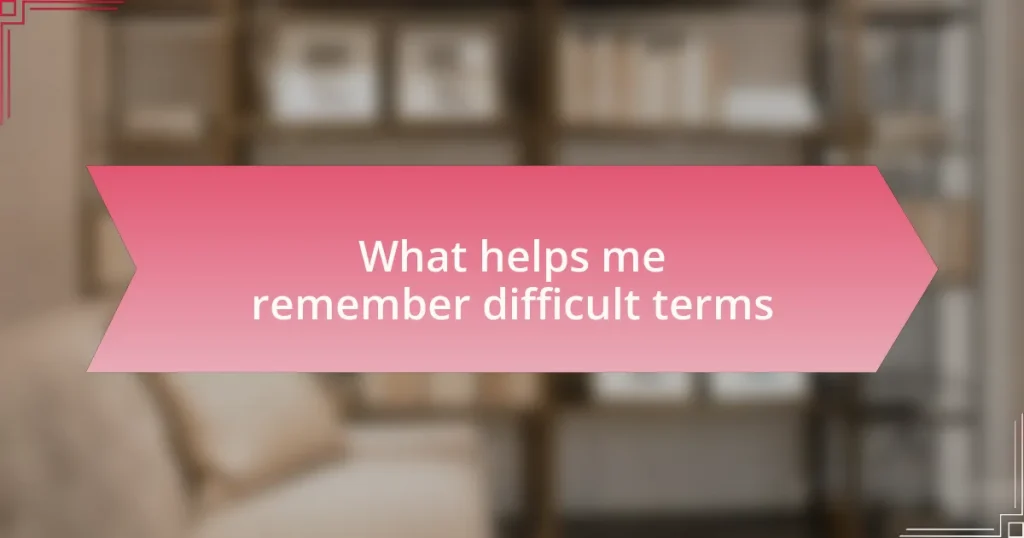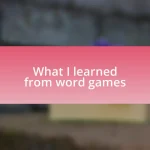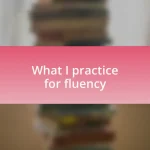Key takeaways:
- Effective memory techniques include visualization, the method of loci (memory palace), and repetition to enhance vocabulary retention.
- Engaging with vocabulary through active practice, such as using new terms in conversation and creating mnemonic devices, strengthens memory and understanding.
- Organizing study notes with sections, color coding, and summarizing concepts in personal language aids in retention and comprehension of complex terms.
- Personal connections and immersive experiences, like associating terms with memories or participating in discussions, make memorization more effective and enjoyable.
Author: Clara Whitfield
Bio: Clara Whitfield is a captivating storyteller and acclaimed author known for her rich, character-driven narratives that explore the complexities of human relationships. With a background in psychology and a passion for literature, Clara weaves intricate plots that resonate with readers on multiple levels. Her debut novel, “Echoes of the Heart,” received critical acclaim and was a finalist for several literary awards. When she’s not writing, Clara enjoys hiking in nature, experimenting in the kitchen, and engaging with her vibrant community of fellow writers. She resides in Portland, Oregon, where she draws inspiration from the lush surroundings and eclectic culture.
Understanding memory techniques
When it comes to remembering difficult terms, I often turn to visualization techniques. For instance, when I needed to memorize the term “metaphor,” I imagined a vibrant scene where a literal heart was transformed into a big, colorful balloon. This imaginative link made the term stick in my mind far more effectively than rote memorization ever could.
Another technique that works wonders for me is the method of loci, or memory palace. I remember walking through my childhood home and associating various rooms with specific vocabulary terms. Each room held an image or a sound connected to the term. Have you ever walked through a familiar place and felt nostalgic? That same feeling helped me recall terms just by mentally revisiting my memory palace.
Lastly, I find that repetition plays a crucial role in reinforcing my memory. I often write down difficult words multiple times, saying them out loud as I go. There’s something satisfying about the physical act of writing mixed with sound—it creates a form of rhythm that anchors the terms in my mind. What simple actions have you found effective in strengthening your own memory?
Importance of vocabulary retention
Retaining vocabulary is essential not just for language learning but also for effective communication. I remember the frustration of not being able to express my thoughts clearly due to a limited word bank. It made me realize that vocabulary retention was not merely a study task; it directly impacted my confidence and ability to connect with others. Have you ever felt that hesitation when searching for the right word? It can be a barrier that holds you back in conversations.
One of the most significant benefits of retaining vocabulary is its influence on comprehension and creativity. I often engage with complex texts and feel a sense of achievement when I understand nuances in meaning, thanks to a rich vocabulary. It opens the door to deeper discussions and creative expression. Imagine crafting a poem or a story—without the right words, wouldn’t that feel like trying to paint without colors?
Moreover, a strong vocabulary can enhance both personal and professional growth. I distinctively recall an interview where my use of precise terms created a solid impact on the panel. That moment underscored how vocabulary retention is not just about memorizing but about being understood and making a memorable impression. Doesn’t it feel empowering to speak confidently and articulate thoughts accurately? Such mastery not only elevates our communication skills but also paves the way for new opportunities.
Strategies for remembering terms
When it comes to remembering difficult terms, one effective strategy I’ve found is using mnemonic devices. For example, I once struggled with the term “antidisestablishmentarianism.” By breaking it down into smaller parts and creating a vivid image in my mind—like a church and a government arguing—I was able to recall it more easily. Have you ever made a silly image to remember something tricky? It’s surprising how a little creativity can make a term stick in your memory.
Another tactic that has worked wonders for me is the power of association. Linking a new word to something familiar can create a mental bridge that makes retrieval easier. I remember learning the word “ameliorate,” which means to make something better. I associated it with a friend who always finds a way to improve our group projects. Every time I think of “ameliorate,” I picture her sharpening our ideas, making the term feel more relevant and easier to remember.
Finally, practice makes perfect. Simply using a new term in conversation or writing can reinforce its memory. I have a habit of incorporating new vocabulary into daily discussions. For instance, when I began using “ubiquitous” in various contexts, it quickly became part of my everyday lexicon. Have you ever actively tried to use a new word? There’s a unique satisfaction in hearing it flow from your lips, as if you’ve fully integrated it into your language arsenal.
Utilizing mnemonic devices
One method that I’ve found particularly useful involves creating acronyms. For example, when I needed to remember the order of operations in mathematics—Parentheses, Exponents, Multiplication and Division, Addition and Subtraction—I transformed it into the catchy phrase “Please Excuse My Dear Aunt Sally.” Not only did this phrase brighten my study sessions, but it also turned what could have been a dry formula into something memorable. Have you ever noticed how a simple phrase can lighten the load of complicated information?
I also enjoy making rhymes or little poems to recall challenging terms. When I was trying to grasp the term “photosynthesis,” I came up with a playful couplet: “Plants take in sunlight, and they sing, producing food, oh what a thing!” While it may sound silly, this technique turned a complex scientific process into a fun little song in my mind. Has a rhyme ever stuck with you in a surprising way, turning a daunting term into a melody?
Lastly, I often engage in visualization techniques, which involve creating a vivid mental image connected to the term. For instance, when I tackled “quintessential,” I imagined a perfect, glowing five-pointed star representing the ideal version of something. That bright image helps me recall the term in a flash. How powerful is it to have a personal picture in your mind, transforming abstract concepts into tangible memories?
Creating effective study notes
Taking effective study notes is a game changer for retaining difficult terms. I remember back in college when I struggled with complex vocabulary in my English literature class. I started organizing my notes using a system where I divided the page into sections: definitions, examples, and synonyms. This structure not only made reviewing more efficient, but it also created clear pathways in my brain for each term. Have you ever found that a little organization can turn chaos into clarity?
Another strategy I found particularly engaging is the use of color coding. Each color represents a different category of information, like verbs in blue and adjectives in green. When I tried this, it transformed my monotonous notes into a vibrant study tool. The colors caught my eye and made it easier to distinguish between similar terms. Isn’t it interesting how something as simple as color can enrich your learning experience?
In my experience, summarizing concepts in my own words has been incredibly effective. Instead of copying definitions verbatim, I’d rewrite them in a way that made sense to me. This personal touch not only deepens my understanding but also makes the terms feel more relevant to my life. Have you ever noticed how explaining something to someone else helps solidify your grasp on the subject?
Engaging with words through practice
Engaging with words doesn’t just mean writing them down; it’s about immersing myself in them. I’ve discovered that using new vocabulary in conversations is one of the most impactful ways to remember. For instance, when I learned the word “quintessential,” I made a conscious effort to use it when discussing literature or art. It’s amazing how that practice turned a difficult term into a familiar friend.
Another technique I’ve found helpful is creating flashcards with the terms on one side and their meanings or examples on the other. It might feel a bit old school, but there’s something rewarding about physically engaging with the words. I vividly remember prepping for an exam by flipping through cards while cooking dinner. Suddenly, the mundane task became an opportunity to reinforce my vocabulary without feeling overwhelmed. Have you ever tried combining study with everyday activities? It can make learning feel less like a chore and more like a lifestyle.
Participating in discussions or online forums brings vocabulary to life in unprecedented ways. I often share my insights in literary groups where I can use these challenging terms naturally. Each interaction reinforces my memory and understanding. It’s a kind of magic how discussing ideas makes the terms stick in my mind. Have you ever noticed that sharing knowledge with others not only helps them but often helps deepen your own understanding too?
Personal experiences with memorization
Memorizing challenging terms often feels like climbing a steep hill, but I’ve found that personal connections can ease the journey. For example, when I struggled with the word “ephemeral,” I forged a bond with it by associating it with fleeting moments in my life, like a beautiful sunset. Every time I recall that sunset, the word comes rushing back, transforming a once-daunting term into a cherished memory.
One memorable instance of memorization happened during a book club meeting. We were discussing a novel that prominently featured the term “juxtaposition.” As we shared our thoughts, I began to visualize the contrasting elements in the story. That visualization made the term resonate deeply with me. Have you ever experienced a word becoming clearer through storytelling? It’s that kind of immersion that cements these difficult terms in my mind.
I also remember a time when I created a little game with friends to practice difficult terms. We would take turns using new vocabulary in unexpected contexts, like creating silly sentences or rhymes. I still chuckle at the absurdity of some phrases, and oddly enough, I can recall those terms better than the serious definitions I once struggled with. Engaging with words in a fun way not only makes them easier to remember but also adds a layer of joy to the learning process. How do you make learning fun?















